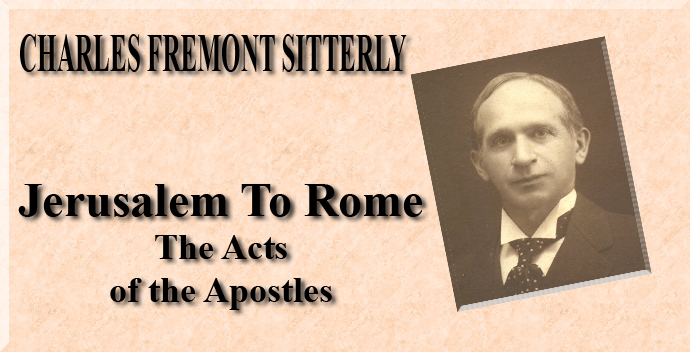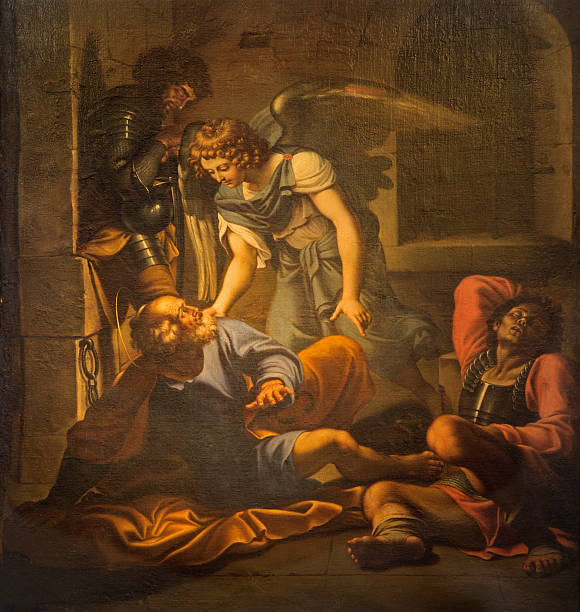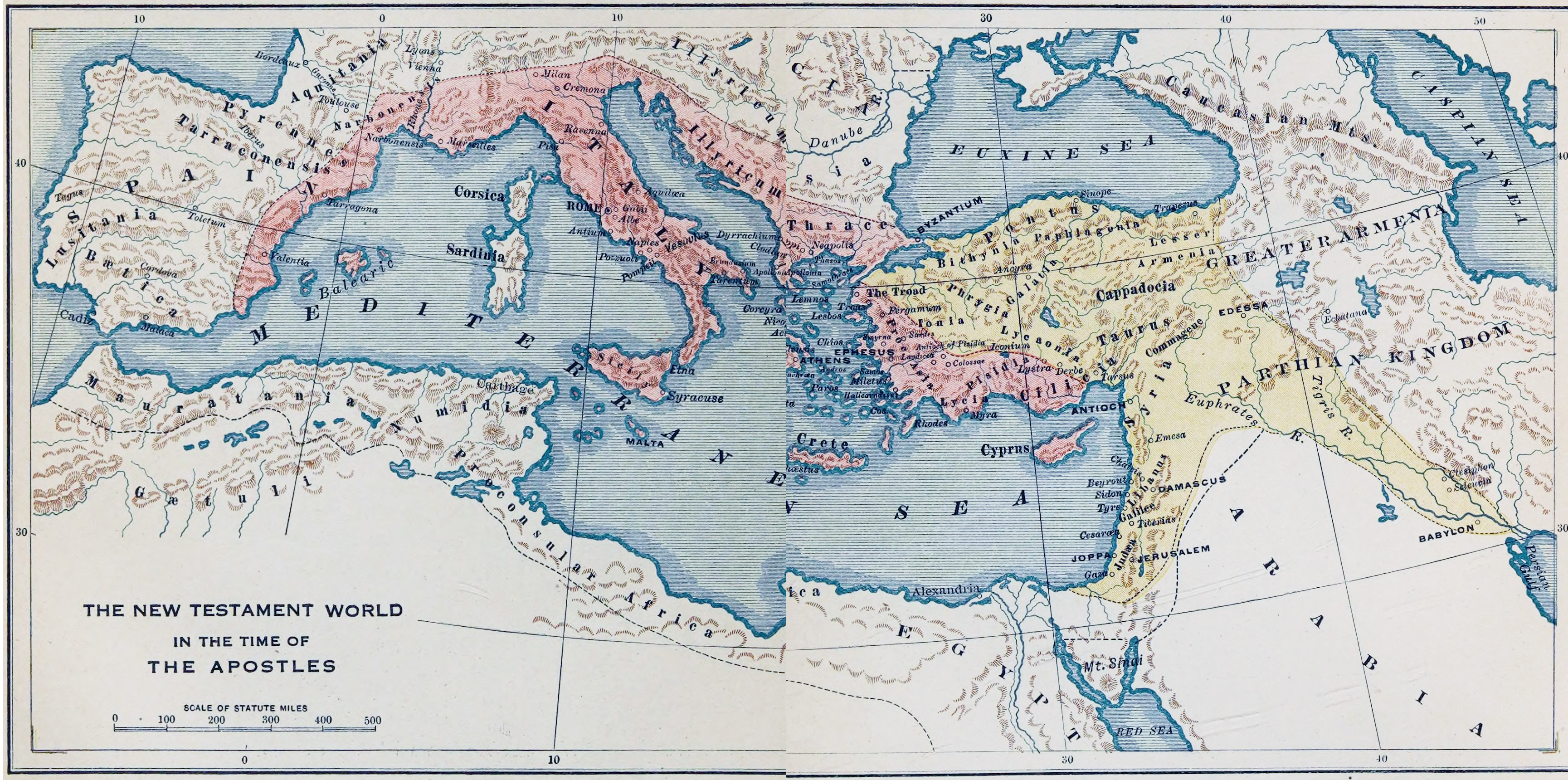|
About that time King Herod laid violent hands on certain members of the church. He killed James the brother of John with the sword, and when he saw that this pleased the Jews he proceeded to apprehend Peter also. This was during the days of unleavened bread. When he had arrested him, he put him in prison and handed him over to four sets of guards of four soldiers each for safety, intending to bring him out again to the people after the Passover. So then Peter was under guard in prison; meanwhile the church kept praying earnestly to God for him.
|
|
A new government that knows not Joseph has now come into control. The rule of a Roman proconsul is mild at any time beside that of a Herod, and Agrippa I was true to the worst Idumzan side of the house. He was grandson of Herod the Great, brought up in Rome, and on the accession of Caligula to the purple (A. D. 37) was given rule over the provinces previously held by Philip and Lysanias (Luke iii, 1). When Claudius became emperor (A. D. 41) he gave Herod rule over all the west of Palestine, making his kingdom even greater in extent than that of his grandfather. Of course it is clear that Agrippa would not have made James his first target had not that Apostle, whom we know from the Gospels to have been among the foremost of the Twelve, been very prominent in the work of preaching at Jerusalem. Now, as we have hitherto heard nothing of this in the book of Acts, we get an indirect light on the state of things, and are no doubt warranted in supposing that the Ten behind Peter and James were all busily active as also the five Deacons were behind Philip and Stephen. It will be remembered that James was the older of the two sons of Zebedee, whose mother Salome, Jesus’s aunt, asked if they might share the Master’s sovereign rule in close fellowship when He came to the crown. Jesus in reply asked if they felt able to assume the needful responsibilities and risks involved, to drink the cup of death which He should drink. They answered,
“We are able!”
Taking them at their word, He said,
“Ye shall indeed drink My cup.”
And now the first of the martyr Apostles is James, and at the close of his generation, we have reason to believe, John was the last.
It is well to remember that the outbursts of persecuting hatred and violence are in direct proportion to the success of the movement. against which they are ‘hurled. For more than a decade now every method that the unscrupulous Sadducees and Sanhedrin and elements of the baser sort could invent has failed to stem the tide of advancing Christianity, and although the Twelve have been exempt from direct assault it is felt that more extreme steps must now be taken, and that possibly if some of the Apostles are murdered the rest will flee the city and the desired peace be secured. It is still clear that this extreme policy could not be safely launched under the name of religion, and so the delight in welcoming Herod
to their camp was openly expressed by his sycophant churchmen. Of the four ways in vogue among the Jews for public execution— stoning, burning, strangling, and beheading—it has been thought that the last possibly indicates here Herod’s special assumption of responsibility, since death by the sword was the most royal. The method also of Peter’s arrest, and the elaborate assignment of royal guards for his safe-keeping in the royal dungeon, point the same way. The Captain of the Temple well knew how likely Peter was to slip past ordinary turnkeys and must have felt relief at sight of sixteen legionaries quartered in the outer prison court. Possibly he suggested that two of these grenadiers be daily and nightly chained to their dangerous charge.
|
|
The very night before Herod was going to bring him to trial Peter lay sleeping between two soldiers, chained with two chains, and guards before the door guarded the prison. Suddenly an angel of the Lord stood beside him, and a light shone in the cell; and striking Peter on the side he roused him and said,
“Get up quickly.”
With that the chains fell from his hands. And the angel said,
“Fasten your girdle and put on your sandals.”
This he did. Then the angel said,
“Throw your cloak about you and follow me.”
He went out and began to follow him, yet Peter could not realize that what the angel did was true, but he kept thinking that he saw a vision. So when they had passed the first guard and then the second they came to the iron gate which leads into the city. This opened to them of its own accord, and passing out they went along one street, when suddenly the angel left him. Then Peter, coming to himself, said,
“Now I surely know that the Lord has sent His angel and freed me from the hand of Herod and from everything the Jewish people expected.”
Thus reflecting on the situation, he came to the house of Mary, the mother of John, surnamed Mark, where a great many were gathered together for prayer. When he had knocked at the door of the porch a slave girl named Rhoda came to answer it; but when she recognized Peter’s voice, from very joy she did not open the door but ran
in and announced that Peter was standing outside the door.
“You are crazy,” they said.
But she kept asserting that it was he. Then they said,
“It is his angel.”
Peter, however, kept on knocking, and when they had opened the door and saw him, they were amazed. He beckoned with his hand to them to be quiet, and explained to them how the Lord had brought him out of the prison.
“Tell James and the brothers about it,” he said.
Then he left them and went to another place.
|
|
For a fortnight Peter has enjoyed the close attentions of his Roman keepers, Passover is done, and the strangers from the provinces have largely gone. Owing to the recent death of James and the present imprisonment of Peter, probably no public preaching was going on during the festival, and the Sadducees and many partisans of Herod among the Pharisees were looking forward to another martyrdom with pious complacency. But prayer is being practiced without ceasing all this time. Ever since the days of Christ in the flesh the home of Mark’s mother has been a center of special comfort and refuge to the inner group of Jerusalem believers. Though Peter’s work in the Hebrew capital is all but finished, and our book is soon to leave him out of any further particular primacy, still his work in the Master’s plan is only just well started and a long and prosperous course yet awaits him largely throughout the lands and cities of the Dispersion even unto Babylon, but at length he must be advanced to the martyr’s crown in Imperial Rome. Like all true prayer, this of the united church is heard. Again God’s angel appears in the foreground, and Luke, who knows how to tell of angel visitations better than almost any other biblical writer, gives full rein to his facile pen. That Luke was reputed to have been an artist we can easily understand. He was truly a word-painter and a portrait painter. Of course Peter was the ultimate source of this tale, though it is difficult to think that Luke did not get some details direct from the lips of the happy slave woman, Rhoda. His few, clean strokes leave nothing to be added.
The many faithful friends of Peter must have realized that a few hours would determine his fate, for they continue all night in prayer. Proof that the house must have been large and the dwelling of a person well to do is seen in its capacity to entertain many and in the employment of the special caretaker of the door, Rhoda. The latter’s sure conviction that she knew Peter’s voice shows that he had been a frequent visitor, her joy, that she was a Christian convert. The incredulity of the company as to her announcement of Peter’s release does not impugn their faith but shows merely their surprise that his rescue should have come in so miraculous a form. Their remark about “his angel” would seem to indicate that some feared that he was already executed and his spirit had begun to wander free from the flesh. When Peter at last was admitted his chief concern was lest James, the Lord’s brother, and the Apostles fail to know of his actual escape. Since it was inexpedient to remain and incur still further penalties, he doubtless took refreshment and withdrew to Bethany or Emmaus before morning.
|
|
The next morning there was a great stir among the soldiers as to what could have become of Peter. When
Herod had him searched for and could not find him, he sharply questioned the guards and ordered them off to be executed. Then he went down from
Judea to Caesarea and stayed there.
Now Herod was very much incensed against the people of Tyre and Sidon. So they waited on him in large numbers, and won over Blastus, the king’s chamberlain, and begged for peace, because their country depended on the king’s for its food supply. So on a set day Herod put on his royal robes, took his place on the judgment seat, and proceeded to make them a speech. The populace kept calling out,
“The voice of a god, and not of a man!”
And all at once an angel of the Lord smote him because he had not given the glory to God, and, being eaten up by worms, he expired.
|
|
The chagrin next morning of the officers and men in charge of Peter’s prison is not difficult to imagine. In contrast with their ill-concealed wrath and blustering officiousness, as they scoured the city and roughly questioned every possible clue, the self-effacement and preoccupation of the Christians was painful. When the king, anticipating a day of special pleasure in accomplishing for his ecclesiastics what they had hardly dared ask, is at last informed of the Apostle’s escape, his anger knows no bounds. Though the Greek does not clearly say in legal terms that he executed the guilty guards, the common opinion that he did is borne out both by the language and by the reputation of that ruthless monarch. No Herod in all the line had more nearly lived up to the worst standards set by Herod the Great than Agrippa I. As though to cover his disappointment in Jerusalem, he goes immediately down to his palace in
Caesarea. There he plunges into another type of controversy. It appears from secular history that Herod Agrippa was ambitious to play the role of dictator as to the maritime policy of all the Phoenician coast. He had especially favored the rise and development of Berytus (the modern Beyrout) and had embellished it in true Herodian style with many great buildings. The inevitable rivalries between the older and newer centers of trade broke out, and Agrippa knew well how to make his imperial partiality weigh heavily upon such great ports even as Sidon and Tyre. Their boards of trade were not novices at handling such difficulties, and by the judicious use of gold, and of flattery, in this instance fully as effective, they gained their end. They bribed Blastus, the king’s chamberlain, and secured a reopening of the case, ostensibly wishing to understand more fully the royal mind. Their large commission, coming hat in hand to pay Agrippa a visit, impressed and flattered him. Taking occasion of the Emperor’s birthday or some great Imperial festival or like event, in which he always joined most enthusiastically, Herod outdid himself in efforts duly to impress the delegation. The excesses in which he indulged, the rising heat of early summer, the already impaired state of his physical system, and finally the overstrain involved in his oratorical efforts, conjoined totally to unhinge his judgment, and when the
sophisticated populace in the theater broke out to acclaim him as worthy of divine honors, like the Emperor himself, with no rebuke nor denial from the royal box, the cup of his proud blasphemy overflowed, and even Jehovah could endure no more. He sent His angel to end with one stroke of his avenging sword such scenes forever.
|
|
The Word of the Lord, however, kept increasing and spreading abroad. Meanwhile Barnabas and Saul, having accomplished their mission, returned from Jerusalem, bringing with them John, surnamed Mark.
|
|
Despite the efforts of Herod Agrippa I to embarrass the progress of the faith, their effect in sum total, like that of other persecutions, was to confirm those already won over and to extend the area of believers all the more widely and rapidly. Meanwhile the season of famine has come and gone and the commission sent with gifts from Antioch to help the Christians at Jerusalem has finished its work, Now we are ready to turn the page and leave the mother church to work out its destiny on the lines already traced. It has passed unscathed through the purifying fires of repeated persecutions, and will endure until the end of the age, revered by the daughter congregations rapidly multiplying in the provinces, and strong in its influence and position in the Holy City until its downfall in A, D. 66-70. For reasons that must have been weighty Barnabas persuades his young kinsman Mark to accompany him and Saul back to Antioch. That he was well to do and therefore no expense to the cause, that he was well educated and a graphic writer, that he had a mind of his own and yet was truly devoted to the point of extreme self-sacrifice to the propagation of the faith, and that he embodied in his own person the best traditions of the Jerusalem community of Christians, all of which we know from his later career and writings, made Mark a distinct acquisition to the bureau of able men who gave themselves in the first generation to the dissemination of the gospel in foreign parts.
|



 Home
Home What's New
What's New Bible
Bible Photos
Photos Hiking
Hiking E-Books
E-Books Genealogy
Genealogy Profile
Free Plug-ins You May Need
Profile
Free Plug-ins You May Need
 Get Java
Get Java.png) Get Flash
Get Flash Get 7-Zip
Get 7-Zip Get Acrobat Reader
Get Acrobat Reader Get TheWORD
Get TheWORD
